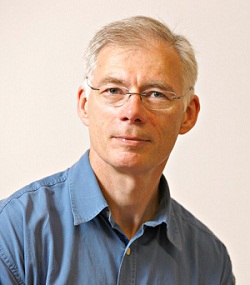£1.3million Wellcome Award to boost immune system research
Published On Wed 16 Jul 2014 by Grant Hill

A University of Dundee researcher has been awarded a £1.3million grant to boost research into the workings of the immune system.
The Wellcome Trust Senior Investigator Award to Professor Paul Crocker will support his laboratory’s research for the next five years.
Professor Crocker’s work focuses on proteins which regulate critical functions in our immune system and are influential in various infectious and autoimmune diseases and in septic shock.
“Our bodies are continuously under threat of attack by infectious organisms,” said Professor Crocker, who is based in the College of Life Sciences at Dundee. “One of the key immune defences are cells called neutrophils which constantly circulate in the blood.
“When a tissue such as the lung becomes infected, neutrophils rapidly leave the blood, enter the tissue and destroy invading pathogens such as fungi and bacteria. It is essential to regulate this process since neutrophils themselves can cause severe damage if too many of them enter the infected tissue, resulting in diseases such as acute lung injury.
“My research is focussed on proteins called ‘siglecs’ that recognise sugar molecules on our cells and on certain pathogens. We have discovered that they are able to control the entry of neutrophils into the lung tissues as well as detect bacteria like Haemophilus influenzae.
“Together with our collaborators in the College of Life Sciences, we aim to use a powerful method called mass spectrometry to work out in molecular detail how these proteins are able to regulate these critical functions in our immune system. We expect that our research will reveal new molecules and signalling pathways that will help us understand disease better and may also help us to develop improved medicines for infectious diseases and septic shock.”
Head of Division, Professor Colin Watts, said: “This is an extremely prestigious award that reflects Paul’s very substantial contributions to the field of immune regulation. Our Division of Cell Signalling and Immunology is the ideal place for him to pursue this research”
The award includes funding for two postdoctoral scientists and a research assistant over the five year period.
More information about Wellcome Trust Senior Investigator Awards is available at http://www.wellcome.ac.uk/Funding/Biomedical-science/Funded-projects/Awards-made/Investigator-awards-recipients/index.htm.
Notes to editors:
About the Wellcome Trust
The Wellcome Trust is a global charitable foundation dedicated to achieving extraordinary improvements in human and animal health. It supports the brightest minds in biomedical research and the medical humanities. The Trust’s breadth of support includes public engagement, education and the application of research to improve health. It is independent of both political and commercial interests. www.wellcome.ac.uk.
For media enquiries contact:
Grant Hill
Press Officer
University of Dundee
Nethergate, Dundee, DD1 4HN
TEL: 01382 384768
E-MAIL: g.hill@dundee.ac.uk
MOBILE: 07854 953277